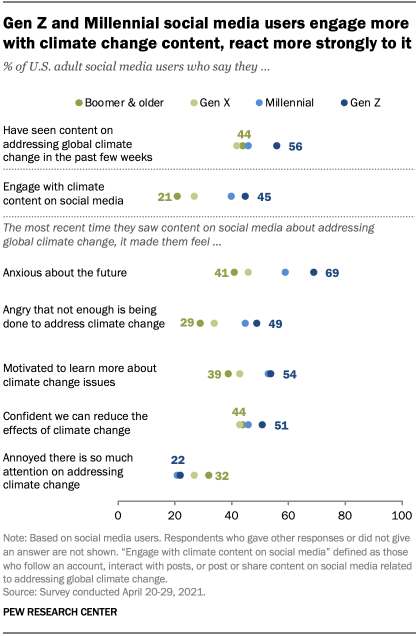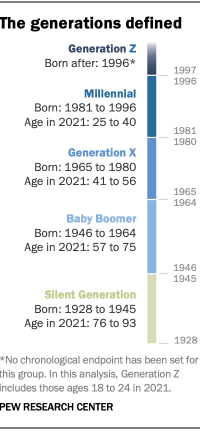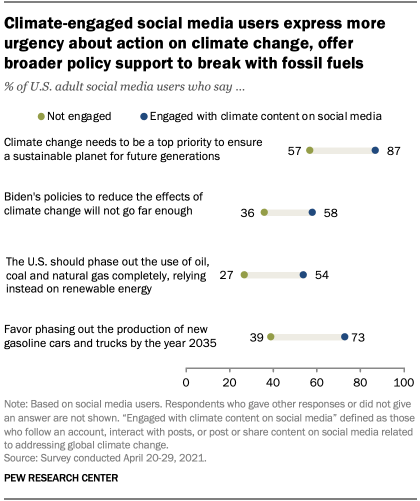Gen Z and Millennial social media users are more likely than older generations online to engage with climate change content on social media and to express a range of emotions when they see climate-related content there – including anxiety about the future and anger that not enough is being done, according to a new Pew Research Center survey.
Younger adults have taken on prominent roles in efforts to stop climate change, with groups and individuals such as climate activist Greta Thunberg and the Sunrise Movement among those working to address the issue.
Among U.S. social media users, 45% of Gen Z adults and 40% of Millennials have interacted with content on social platforms that focuses on the need for action on climate change by following an account, liking or commenting on a post, or posting or sharing content about the need for action on climate change. By contrast, much smaller shares of Gen X (27%) and Baby Boomer and older social media users (21%) have engaged with content about climate change in any of these ways.
Pew Research Center conducted this study to understand how Americans view climate, energy and environmental issues. We surveyed 13,749 U.S. adults from April 20 to 29, 2021.
The survey was conducted on Pew Research Center’s American Trends Panel (ATP) and included an oversample of adults ages 18 to 24 from the Ipsos Knowledge Panel. A total of 912 Generation Z adults, born after 1996, were included in the sample.
Respondents on both panels are recruited through national, random sampling of residential addresses. This way nearly all U.S. adults have a chance of selection. The survey is weighted to be representative of the U.S. adult population by gender, race, ethnicity, partisan affiliation, education and other categories.
Read more about the ATP’s methodology.
Here are the questions used for this report, along with responses, and its methodology.
Gen Z adults, born after 1996, have lived their whole lives in an internet and social media era. These young adults, along with the Millennial generation, were among the first to incorporate social media use into their everyday lives and are much more likely than older generations to say they are online “almost constantly.”
Gen Zers and Millennials express intense emotional reactions to seeing climate change content on social platforms compared with older generations. For instance, majorities of Gen Z (69%) and Millennial social media users (59%) say it made them feel anxious about the future the last time they saw content on social media about addressing climate change. Fewer than half of Gen X (46%) and Baby Boomer and older social media users (41%) say they felt this way the last time they saw climate content. Similarly, Gen Zers and Millennials are more likely than older social media users to say they felt angry the last time they saw climate content because not enough is being done to address the issue.
Generations also differ when it comes to positive emotional reactions: 54% of Gen Z and 53% of Millennial social media users say they felt motivated to learn more about climate change issues the last time they saw climate content on social platforms, compared with 43% of Gen X and 39% of Baby Boomer and older users.
Those social media users who engage with climate change content online – a group that skews younger than the general population – stand out from those who do not engage online in their views about a range of climate-related policies.
Among climate-engaged social media users, 73% favor phasing out the production of new gasoline-powered cars and trucks by the year 2035, and 54% think the U.S. should phase out the use of fossil fuels in energy production entirely. By contrast, much smaller shares of social media users who do not engage with climate content support either of these two proposals (39% and 27%, respectively).
And when it comes to the approach of the Biden administration on climate issues, a majority of the social media climate-engaged (58%) think the administration will not go far enough to reduce the effects of climate change; far fewer among social media users who do not engage with climate content express this view (36%).
Note: Here are the questions used for this report, along with responses, and its methodology.






